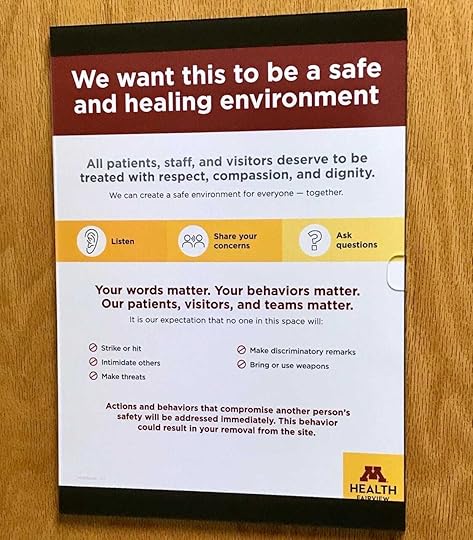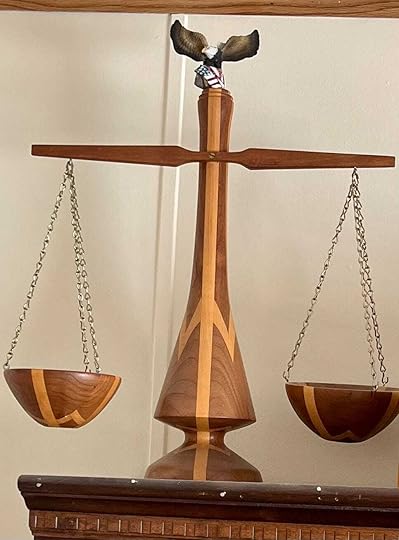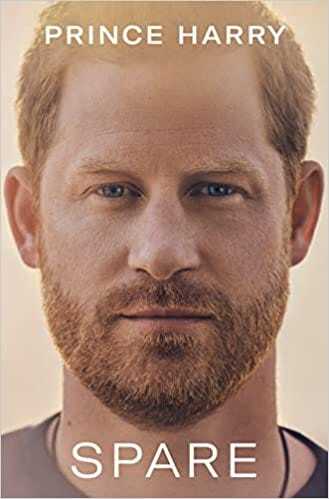Debbie Russell's Blog, page 8
February 6, 2023
The Cost of Kindness
“You’re so easy!”
Wait, before you go off jumping to conclusions, let me provide some context. I was in for my annual eye appointment. Once you hit middle age, it’s recommended that you get your eyes checked yearly, even if you’re like me and only need cheaters.
Because, as I’ve written before, this is the age where we start to fall apart.
But I digress…
The place was super busy for 8:30 in the morning. I started to get a bit anxious when the crowd at check-in seemed stuck with complicated issues. I hadn’t built in that much extra time when I left the house at dawn for the hour-plus drive into the big city. Just as I was next to approach the counter, a staff member approached, cut in front of me, and called out the name of some person who wasn’t me.
My anxiety switched to impatience. Or maybe it was annoyance. Now I was going to be deemed late.
I watched (and listened) as the staff person told the young man that because he didn’t have a referral, the thing he came in for was going to cost a lot of money and he was better off getting a referral and coming back some other time. Why this conversation was happening within earshot of me, I have no idea. The young man was crestfallen.
Actually, I don’t know if he was crestfallen - he, like all of us, was wearing a mask. The staff member apologized profusely. The young man walked away. Then it was my turn to check in.
Turns out I wasn’t late after all.
If you’ve never been in for an eye exam, I’d put it at about a 3-4 on the scale of annoyance or discomfort. Even though I only do this once a year, I’ve become familiar with the routine. Look at the balloon. Read some letters. Here are some drops and we’ll shine a bright light in your eyes. Read some more letters. Here are some stingy drops that will dilate your pupils. Read some more letters.
I’m generally compliant. Why wouldn’t I be?
So when the assistant to the ophthalmologist (is she a nurse? Technician? Optician?) cheerfully exclaimed how easy I was, I wondered to myself: what’s the alternative?

A year ago, at a different routine appointment, I found myself startled by a large sign placed on the back of the door of the exam room. Really? We need to be reminded that we can’t hit, threaten or intimidate others? When did it become necessary to remind us of the need for basic self-control? I realize that medical facilities are among the last places anyone wants to be for any reason. I’ve also learned how stress and fear bring out the worst in many of us, and the pandemic certainly didn’t help. We’re still coming to grips with physical, mental and emotional scars from a catastrophic upending of life as we once knew it.
For me, however, the pandemic created opportunities to be nice to people. To recognize that everyone is just trying to get through their day. To accept the tremendous privilege of good medical care and decent health insurance, knowing that others do not share that privilege.
In other words… to be “easy.”
January 29, 2023
Making Time for Grief
Memory fascinates me.
When I was a trial lawyer, I relied on the memories of my witnesses. I can still feel the sting of frustration when a victim or witness testified differently than their original statement to law enforcement. Such inconsistency was immediate fodder for the opposition.
“Are you lying now or were you lying then?”
Ouch.
Every January, I endure a rush of memories around the loss of my first dog Molly. Molly’s birthday was January 29, 1998. I don’t recall the exact date of her death, except it was on Martin Luther King Day in 2010. My brain does not allow for the storage of death dates, with one notable exception: my dad.
But I digress.
What I remember about January of 2010 can be replayed like scenes in a movie. The thing about hemangiosarcoma, is it sneaks up on dogs and shatters the hearts of those who love them. If you are lucky enough to share your life with a dog, you will understand when I tell you that in mid-December I started to think there was something “off” about her. Nothing major, mind you, just a slight dimming of her spirit light.
Within a few weeks, her left eye gave out. Something about pressure behind the eye and the veterinary ophthalmologist recommended its removal. I should add that before January of 2010, I did not know veterinary ophthalmologists existed. I’m proud to say I approached that surgery with good stoicism. It helped that I knew a one-eyed dog who ran flyball – Molly’s sport. Having also gone through two ACL surgeries with her, I came to understand that we humans bear the burden of emotion as it relates to our dog’s physical challenges.
January 2010 also brought with it a first-degree murder trial on my professional calendar. Scheduled for January 25th, it involved a man who drove to his wife’s workplace and sprayed her with bullets as she was driving out of the parking lot. If I had to guess with the benefit of hindsight, I was feeling significant anger that the case could not be settled. But criminal defendants have an absolute right to a jury trial and this defendant was no exception.
In those days, I could not spare much time to feel anything at all. While I no longer recall exact dates, I remember the morning I took Molly for her eye removal surgery. I remember getting ready for work and noticing that she seemed lethargic. I dropped her off and continued on to work. I remember getting the call from the surgeon explaining that her system was crashing and they could not operate. I remember hanging up and walking into a colleague’s office, shutting the door and bursting into tears.
I remember picking her up, driving to the University Vet School and staring down the pre-vet student, as he tried cheerfully to explain that her chest cavity was full of tumors and her heart was drowning in fluid, but surely we could try chemotherapy. I remember agreeing to allow the University staff to drain the fluid from her heart, but declining chemotherapy. I remember promising Molly that I was taking her home for good. I remember starting my first ever death watch.
Can one ever really plan for death?
I did my best.

Every day thereafter I would leave for work, bracing for the possibility that she would be gone by the time I got home. I sent an email to my trial judge, carbon copying my opposing counsel. I explained my situation, including the fact that I lived alone and was solely responsible for my dog. I thought I was being proactive and helpful by alerting everyone that I might have to unexpectedly to take my dog to the vet to have her euthanized. I also clarified that my expected absence would likely occur during jury selection, which would hopefully not be too disruptive.
The judge’s response was shocking. He admonished me for the “informality” of my communication and told me, in no uncertain terms, that jurors were not to be inconvenienced.
As I write this, thirteen years later, I still catch my breath at his overt cruelty. I contemplate the myriad of ways I suffered; the helplessness I endured. I think about what power and the need to control does to people. And to this day, I carry an ache around the darkest, coldest month of the year that is rooted in the past.
I remember meeting with the judge and counsel in his chambers on the first day of trial and him attempting to soften his prior response.
“No worries, Your Honor, she’s already gone.”
I remember the absolute hatred I felt for him as I stuffed my emotions deep down to a place where they couldn’t betray me.
Four years later, writing would become a vehicle for all the pain I kept to myself. I wrote about Molly’s last day here. Reading that piece reminds me that I was still trying to suppress my grief. Or get beyond it. Anything to not actually feel it. I wanted desperately to be like my dogs, who live in the moment 100% of the time. Even now, living in the moment is admittedly my preferred way to be.
Now, as I give myself permission to feel that which I did not allow myself to feel in real time, I give in to a palpable feeling of release. And celebrate the conclusion of another dark and frigid January.
January 25, 2023
How Bad is Unbearable?
It’s been almost five years since I bought my dream property and signed up for the same internet provider the previous owners used. I’m lazy that way. I like to ask people what works for them, as opposed to taking the time to do my own research. It felt efficient at the time, especially since alternative options seemed hard to come by.
Ironically, just a year prior, I’d been stressing about what felt like a monumental change of ditching cable and streaming my TV through the amazing fiber optic internet that had become available for my city bungalow. Change is hard, especially when you’re not tech savvy. But right on the heels of all that stress came the delight in saving a significant amount of money and learning new things.
But I digress...
Naively, it never occurred to me that relocating to a place 25 minutes from the nearest town also meant sacrificing some of the creature comforts I’d grown accustomed to in the big city. You see, in the country, some internet is delivered via satellite. Five years ago, I didn’t even know that was a thing. I also had no idea how absolutely awful satellite internet is. When I signed up for my country internet, I assumed I’d save money on TV by streaming everything, just as I learned to do in the city.
No dice. I tolerated the spinning wheel of sloth-like download (or is it upload?) until football season. Prior to that, I wasn’t even watching much TV. The first summer of country living consumed most of my attention. Then fall arrived, bringing with it fresh hopes for every Green Bay Packer fan - me included. Then, one Sunday afternoon, the unthinkable happened. Right as Aaron Rodgers dropped back to pass, the picture froze and the sloth wheel took over.
I threw a tantrum I’m embarrassed to even think about. The bad had become unbearable.
Within a week, installers for DirectTV arrived and hooked me up. In hindsight, I should have noticed the prior owners’ dish still attached to the roof when I first moved in. Now, addition to the $100/month I pay for entirely inadequate internet access, I get to pay an additional “promotional” rate of $69.99/month so I can watch the Green Bay Packers play football in real time, watch the news and the National Geographic channel. This past year, I’ve debated my need for cable TV, but the thought of the sloth wheel returning paralyzed me from making any significant moves.

I have become the sloth.
As I wrote in a prior post, poor internet served me during the pandemic when I was still working. I didn’t have sufficient bandwidth to support my camera function in meetings and it was awesome. But now that I’m participating in Zoom meetings I actually care about and have lined up several podcast interviews to promote “Crossing 51,” I feel quite differently. The last straw came when I bought a new computer and inadvertently involved Microsoft One Drive in the file transfer process. I won’t bore you with the details, but suffice to say, I quit that mission halfway through.
So…imagine my joy when I opened my mailbox a couple weeks ago to find a flyer nestled inside. It PROMISED high-speed internet at a price half of what I was paying. This time, I did my due diligence. I got on my local Nextdoor app and asked the neighbors what they used for internet. One neighbor confirmed the provider making the big promise was legit and delivered adequate internet speed for video calls.
Hooray! I spoke with a customer service rep who assured me of wonderful things ahead. I signed up for autopay. I scheduled the install.
The morning of the appointment, it all came crashing down via text:
“We’re cancelling your order because it turns out we LIED when we said we could bring high speed internet to your house and make your life markedly better.”
Okay, that’s not really how it read, but that’s how I felt reading it.
I planned this post to be about recognizing when the bad becomes the unbearable and finding the courage to change, even when it feels really hard. I created all sorts of analogies to bad relationships, bad jobs, bad circumstances - you’d have enjoyed it.
Except there’s no such change for me today.
Instead, I need to reframe the concept of unbearable. Which is another life skill that is useful, I suppose. As I sit here right now, I have no way to change my current internet situation. I guess I’ll start by reciting the Serenity Prayer every time a “network error” crosses the screen…
This whole thing was a warmup. A practice round. A dress rehearsal.
If and when faster internet arrives, I’ll be ready.
What sort of unbearable are you tolerating right now, and when will you make the change?
January 19, 2023
That One Day I Missed Practicing Law
Last week I made a social call at my old office and caught up with several work friends. Aside from a brief visit almost a year ago to pick up a box of girl scout cookies, I’ve had no reason to return to the space where I spent almost three decades toiling as a lawyer for the government.
The more things change, the more they stay the same.
By the time I retired in the fall of 2020, we were all working from home, which, for me, was a dream come true. I offloaded a three-hour commute for the freedom and flexibility of getting my work done the way I wanted to get it done. My Wi-Fi was so poor, I often had to turn off my camera, thus relieving myself of the task of projecting interest in meetings I found entirely mind-numbing. I no longer needed to make small talk, an often exhausting and time-consuming chore. I chose to burn up my vacation time and found myself easily able to get my work done in six hour days.
But I digress.
Since leaving the grind of legal work, I’ve written a book and countless other shorter essays. I volunteer at my local wildlife refuge and hone my skills as an amateur naturalist. I spend more time thoughtfully training my dogs. My creative mind is always engaged. I’m learning new ways to be strategic in self-promotion - something that would have nauseated me just a few years ago.
That said, there are days I truly miss the unique intellectual stimulation that came with my old job. You see, I dealt primarily with the human condition. People did bad things and I had to prove that their actions were criminal – easier said than done, sometimes. I was forced to rely on the testimony of witnesses who were impaired, untruthful, afraid, hostile, or a combination thereof. My job at trial was to prove to a group of (hopefully) unbiased jurors, beyond a reasonable doubt, that the defendant committed the charged offense.

The job was stressful; the work environment, often toxic. At some point I could no longer compartmentalize the awfulness of what I faced every single day. When I spoke up about the awfulness, I was involuntarily transferred to civil litigation, which I found loathsome for entirely different reasons.
Much, if not most of the legal profession is conflict based. Negotiations are based on the threat of something far worse if the parties exercise their rights to a trial. When I was a young gun, I preyed upon lawyers and their clients who did not share my love of trial litigation. There was nothing quite so enticing as the opportunity to create a compelling direct examination, or cross examine a known liar. Reading people became my superpower along with listening carefully to every utterance. When victims of domestic violence recanted their initial reports, I found myself at a crossroads when it came time to go to trial. I learned how to look for corroborating evidence when I believed the victim’s initial report. I became a pretty good investigator.
Words matter. You can glean someone’s intent by what that person says.
But you also have to observe someone’s demeanor as they utter the words they want you to believe. Judging credibility is entirely the jury’s job. To believe, or not believe, that is always the ultimate question, and the way words are spoken can easily betray the witness uttering them.
When I popped in on one of my work friends, he and an investigator were studying the words and actions of person suspected of criminal activity and comparing them to the words contained in a particular Minnesota state statute.
“Whoever intentionally, knowingly and willfully…”
Huh?
Seems a bit redundant. And proving all three states of mind could be difficult, if not impossible.
As a lawyer turned writer, words still matter to me. These days, I much prefer the challenge of choosing the best word to describe a scene, person or action - to that of trying to prove someone committed a crime.
Especially when they’ve used their own words to deny it.
January 10, 2023
Prince Harry, Memoir, and the Dysfunctional Family
“And if they didn’t know why I’d left, maybe they just didn’t know me. At all.
And maybe they never really did.
And to be fair, maybe I didn’t either.
The thought made me feel colder and terribly alone,
But it also fired me up. I thought: I have to tell them.
How can I tell them?
I can’t. It would take too long.
Besides, they’re clearly not in the right frame of mind to listen.
Not now, anyway. Not today.
And so:
Pa? Willy?
World?
Here you go.”

This prologue, from the sample for the Kindle edition of Prince Harry’s memoir, entitled Spare, and ghostwritten by the talented writer/memoirist J.R. Moehringer, makes plain Prince Harry’s motivation for thrusting his personal story out into the greater universe.
He needs, most desperately, to explain. And be heard.
As someone who grew up in a dysfunctional family, I can relate. There comes a point when the façade that is being presented to the world simply cannot hold. While I did not grow up a royal, from a very early age, I was acutely aware of the effort made to present our family as far more stable than it actually was. As a child, I was urged by my mother to have a broad smile and perform for guests, whether it was on the piano, or simply sharing what I was doing in school. She measured my worth by these performances, consigning me to a life as an overachiever and perfectionist.
Thankfully, my father possessed a more loving and accepting view of his children. Whenever I failed (and there were plenty of disappointments), he was always there to pick me back up and show me how to try again. Lord knows, his own life was full of “try agains.” While my mother raged, he silently and diligently worked to make things right. When he died, the fragile, patched up foundation of our family structure crumbled.
For a time, I fought against the inevitable. After all, it’s still quite counter-culture to acknowledge family estrangements. Movies and TV shows focus on family reconciliation and forgiveness. Unsurprisingly, we don’t acknowledge that things might not be as rosy as what we portray in our social media posts. The activities of the royal family bring this into sharp focus. Beautifully dressed, always stoic, they often remind me of exotic animals in a zoo. They are trotted out at events for their adoring fans to worship. Births, deaths, and other achievements are presented to the public, because that’s part of the centuries-old bargain struck between the monarchy and its subjects. The family motto? “Don’t complain, don’t explain.”
When I first began studying dysfunctional families, I felt relief in learning that my own behavior and buried emotions were actually quite legitimate when placed in that context. More recently, I’ve read two magnificent works of fiction that clearly (and quite painfully) portray ways that families fall apart. In We Were the Mulvaneys, Joyce Carol Oates writes:
“Members of a family who’ve lived together in the heated intensity of family life scarcely know one another.”
In Remarkably Bright Creatures, Shelby Van Pelt writes:
“Had she and Lars ever been close? Tova is certain they were, once. As children: certainly. As young adults: mostly. …But things started to change after Erik died. Once in a while, one of the Knit-Wits probes Tova, asking what happened between her and Lars, and Tova says nothing, really , and this is the truth. It happened gradually. No blow-out arguments, no fist-shaking or hollering.”
The thing about dysfunctional families, is that the children do not choose that arrangement, rather, they are born into it. Much like being born into the British monarchy. Anyone who has watched The Crown from the beginning has received an education in what family life is like inside those gilded cages. When Harry refers to his family as “the institution,” I can relate. Family secrets are not to be disclosed, regardless of your lineage and relative prominence in your community.
Another thing: Grief wreaks havoc on an already shaky family system. For Prince Harry, that grief surged into his life at the tender age of twelve. Managing it within the confines of the institution was practically impossible, especially in light of the fact that his father had already moved on.
As memoirists, we write, in part, to heal. But what is the point of the story if others cannot relate, learn, or be inspired? I will be interested to see if Prince Harry’s story is well received. If the response is anything like it was to the Netflix series, I suspect we’ll be quite divided. Books by celebrities that are merely “tell-all” have a limited shelf life.
Also, if the prologue is any indication, Prince Harry just wants the world to hear his side of the story. Perhaps he hopes to change how business is done inside the institution. Maybe he wants to bring the whole thing down. I’ve heard him express his hopes for reconciliation. I have my doubts that those particular hopes will be fulfilled.
As for me, I believe the more we can shine light on dysfunctional families and explore ways to reduce the stigma around them, the better off we’ll all be. And if Spare contributes even a little bit to that conversation, I’m there for it.
If you’re interested, my Not Quite a Memoir entitled Crossing 51 will be published in June. You can find more information at my website.



